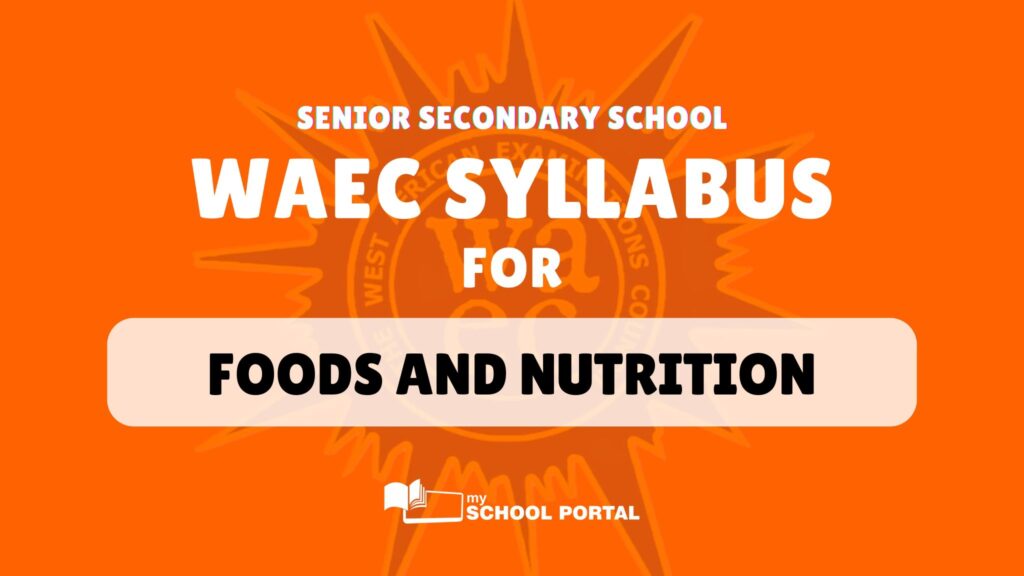Foods and Nutrition as a vocational subject prepares students for the world of work. It also encourages the creative use of local foods and associated food service to meet the nutritional needs and other demands of consumers. WAEC Syllabus for Food and Nutrition examination is set to assess candidates’ ability to:
- Acquire basic knowledge about foods and nutrition;
- Understand the relationship between nutrition and health;
- Identify career opportunities in foods and nutrition and acquire skills for further studies;
- Apply the general principles underlying meal planning, selection, preparation and serving of food to feed family and other consumers for different occasions;
- Understand the need for planning an efficient and safe kitchen;
- Choose, use, care and store kitchen equipment and tools effectively;
- Appreciate the importance of sanitation in the kitchen food preparation and service;
- Apply basic principles underlying food processing, storage and preservation;
- Acquire basic knowledge in consumer education;
- Acquire research skills and use the information to experiment, develop and improve local dishes;
- Set up a business in the food industry using all the basic skills acquired.
There will be three papers, Papers 1, 2 and 3 all of which must be taken. Papers 1 and 2 will be a composite paper and will be taken at one sitting. Paper 1 will comprise sixty multiple choice questions, all of which are to be answered within 1 hour for 60 marks. Paper 2 will comprise six essay questions out of which candidates will be required to answer four. The paper will carry 40 marks and will last 1 hour 15 minutes. Paper 3 will be a practical test of 3 hour duration. It will carry 100 marks and will be conducted by a visiting examiner.
Detailed WAEC Syllabus for Food and Nutrition
- Nutrition and health
- Introduction to Foods and Nutrition
- Careers associated with Foods and Nutrition
- Basic Food Nutrients
- Meal Management
- Meal Planning
- Special Nutritional Needs
- Food laboratory and equipment
- The kitchen
- Kitchen equipment and tools
- Safety in the kitchen
- Sanitation in the kitchen
- Food commodities
- Animal and animal products
- milk and milk products e.g Cheese, yoghurt
- eggs,
- meat,
- poultry, fish etc
- Cereals/grains
- Fruits and vegetables
- Legumes and oily seeds
- Fats and oils
- Starchy roots and plantain
- Animal and animal products
- Food storage and preservation
- Food spoilage
- Food preservation
- Food storage
- Food preparation
- Principles underlying cooking
- Methods of cooking
- Transfer of heat
- Cooking terms
- Food additives
- Flour Cookery and Confectionery
- Types of flour
- Basic ingredients in flour cookery
- Raising agents
- Batters and doughs
- Cakes
- Pastries
- Yeast Mixtures
- Cake Decoration: Icing
- Beverages
- Classification of beverages
- Importance of beverages
- Principles underlining preparation of beverage
- Convenience foods
- Rechauffé (leftover) foods
- Festive dishes/special occasion dishes
- Art of entertaining
- entertainment
- Table setting and etiquette
- Meal Service Style
- Experimental cookery
- Research into Local dishes and Drinks
- Experiments
- Consumer education
- Consumer Education
- Food Budgeting
- Food Purchasing
- Self employment
- Setting up and managing a catering enterprise
- Work ethics
- Packaging
Related
Stay updated with the latest student resources and insights from My School Portal! Subscribe to our newsletter for fresh content delivered straight to your inbox—no spam, just value 😊














